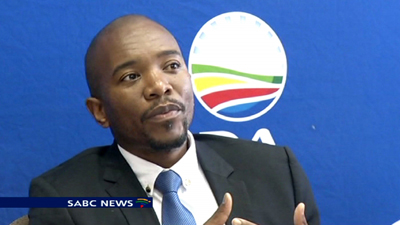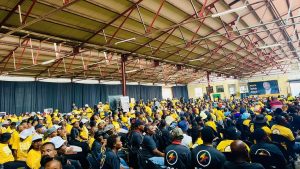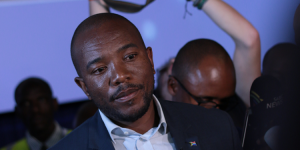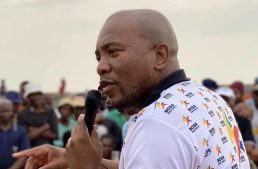Helen Zille’s strategy was to stay on as the leader of the Democratic Alliance (DA), South Africa’s largest opposition party, until she had built up a pool of black leaders, one of whom could take over from her. She achieved her goal with the election of Mmusi Maimane as DA leader.
Maimane’s election also signifies that the DA has socialised its members – who are overwhelmingly white and coloured with former members of the old National Party outnumbering those of the old Progressive Federal Party – into accepting that they will follow a mostly black leadership at the top for the foreseeable future.
The more black leaders that the party acquires – like Maimane, Lindiwe Mazibuko and Wilmot James – the less convincing its opponents taunts’ about “Oreos”, “coconuts” and “rent-a-black” become. The first two terms derogatorily refer to people as black on the outside but white on the inside. The latter term refers to the accusation that the DA uses black people to achieve its ends without them wielding real power.
Over the weekend, the preacher (Maimane) won over the professor (James); the populist deacon triumphed over the dean. It means the DA, like the African National Congress (ANC), calculated that a black rather than coloured leader is needed for victory at the national level.
Internal party reform
In his campaign for the top job, James touched on a sensitive issue. His eight-point plan for the DA referred to the need to restore internal democracy within the party. He argued for decisions to be taken constitutionally by the appropriate structures, not by one person. He said that the time of an overwhelming leader was past.
Maimane may still lead the DA less autocratically. But what remains to be seen is how internally democratic the DA will become, or if a powerful clique of leaders around Maimane will hold the reins tightly.
Until now, the DA has been defensive and secretive about its membership numbers, arguing that it focuses on getting votes, not members. But if the DA wishes to win over cities and provinces, it will need to sign up African members in numbers that will outnumber its white and coloured members. If it succeeds, it will be challenged not to let factionalism break out as numbers go up.
Prospects for 2016 and 2019 elections
The results to look for in the 2016 local and 2019 national elections are for two metropolitan areas in the economically strong Gauteng province – the economic capital and largest city Johannesburg and the executive political capital Tshwane – as well as Nelson Mandela Bay metropole, a traditional ANC stronghold in the Eastern Cape, one of the country’s poorest provinces. Will the DA win three, two, or one? Or none of them?
For the DA to win both capital cities, or to win South Africa’s largest city, or to win a historic ANC centre, would be a boon. If the DA wins none, its claims will be exposed as hype without substance.
Similarly, if the DA captures Gauteng Province in addition to the Western Cape, it will be a major feather in its cap.
If such an electoral swing occurs, it will vindicate the DA’s controversial decision to prioritise pouring its 2014 election campaign funds into Gauteng instead of the Northern Cape.
Where the ANC vote falls below 50%, but the ANC and Economic Freedom Fighters (EFF) combined vote is more than 50%, all eyes will be on whether the EFF votes with or against the ANC. Will the EFF, on a vote-by-vote basis, put the DA into power?
Coalition prospects
Coalition politics are key to how far the DA advances. So far, the only parties that have formed coalitions with the DA are shrinking parties on their way down, such as the defunct National Party and the Independent Democrats – which was then led by Patricia de Lille, now the mayor of Cape Town and a DA leader.
Such coalitions have been interim arrangements, pending the DA swallowing the shrinking party.
There are two potential future candidates for a coalition and merger with the DA at the national level. They are the Congress of the People and the United Democratic Movement. A greater variety of local actors exist at the municipal level. Will Maimane be as successful as Zille was when she mayor of Cape Town in forming coalitions?
Tackling corruption will be key
The DA’s success under Maimane will also rest partly on how the party deals with corruption, an issue that has moved centre-stage in South African politics under the Zuma administration.
The media depicts corruption as a narrative of naming and shaming celebrities. This is only part of the story. It fails to analyse a system that uses the patronage of budgets, contracts and jobs to practice clientelism. The incumbent party swings cash or jobs to those who can re-gift the money to electioneering funds, or bring voters to the polling stations.
No-one alleged President Goodluck Jonathan was personally corrupt, but he led Nigeria’s outrageously corrupt political system. Prime Minister Manmohan Singh had personal impeccable integrity, but ruled over uproar against corrupt governance in India.
A major lowering of corruption will require more than extra policing; it will require changing the system. It certainly require fewer and simpler criteria for awarding all public sector tenders.
Closer to home, will Maimane address the role of money and business interests within the DA – an issue which causes public criticism of the ANC? The DA has been as opposed as the ANC to passing a law requiring parties to publicly disclose their donors’ identities.
Within Cape Town and the Overberg, there is a growing view that property developers are to the DA what arms dealers were to the ANC. Until now, only the investigative magazine Noseweek has probed why neighbours’ objections to property deals are almost always overruled. In future, more of the press may take this up.
Nor has the DA shown itself to be immune to the arrogance that mars prolonged incumbency as is evident in the Wynberg myciti bus route demolitions.
A credible leader?
Criticism of Maimane in the press has been that he is a “hollow man” – that he is all style and no substance. Another criticism is that he tends to stumble if questioned on issues that he has not been briefed on.
But today it is the norm for leaders to have speechwriters. Former president Thabo Mbeki was an intellectual exception who wrote major parts of his own speeches.
Maimane should benefit from the DA drawing on its own researchers and media professionals in its most recent selection of parliamentary candidates. This should mean that the performance of its leader, and its MPs, in understanding issues and in public speaking ought to be slick and professional.
So, on the question of Maimane’s potential for greatness, the jury is still out. Much will depend on the calibre and views of those who Maimane selects as his close advisers. Will they include James?
![]() To achieve greatness almost always requires achieving the prerequisite to get things done – in other words power. Unless Maimane, or his successors, become president or at least deputy president in any future coalition, they will be severely limited in what they can achieve.
To achieve greatness almost always requires achieving the prerequisite to get things done – in other words power. Unless Maimane, or his successors, become president or at least deputy president in any future coalition, they will be severely limited in what they can achieve.
Keith Gottschalk, Political Scientist, University of the Western Cape
This article was originally published on The Conversation on May 10, 2015. Read the original article.
Author
-
Multimedia Manager at SABC News · Wits - University of the Witwatersrand





